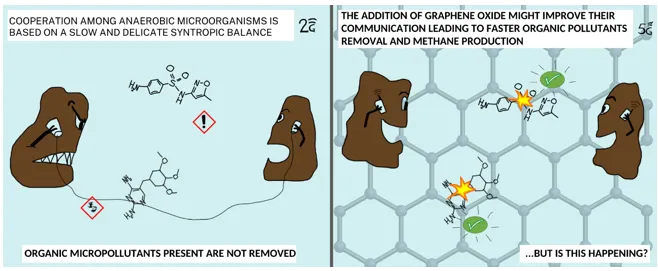The project uses a nanomaterial to upgrade existing treatment technologies. Through graphene oxide (GO) addition into anaerobic wastewater treatment systems, the project aims to enhance the removal of organic micropollutants (OMPs), i.e., persistent pollutants with unknown long-term effects.
Although anaerobic treatments are preferred over aerobic due to the lower energy requirements and the possibility of producing energy in the form of biogas, they present some drawbacks. One is the slow ability to degrade organic materials, which makes the anaerobic systems, made of a complex and delicate mixture of microorganisms, incapable of dealing with the already recalcitrant OMPs. However, by adding the GO, the connection among microorganisms may be enhanced and the reaction times can be drastically shortened, allowing the removal of recalcitrant OMPs. Thus, this project studied the biogas production and the OMPs removal and transformation in anaerobic batch assays amended with GO.
As a prerequisite for improved degradation kinetics, GO must first be biologically reduced via microbial respiration. Results revealed that such GO’s biological reduction occurred within one day. Notably, this is the first study demonstrating it using a real culture of an anaerobic digester rather than single or lab-cultivated microbial strains. However, the removal of the two antibiotics (sulfamethoxazole and trimethoprim), selected as model OMPs, occurred in a few days regardless of the presence of GO. Furthermore, GO presence had an inhibitive impact on the formation of sulfamethoxazole’s transformation products and the biogas yield by up to 20%. Therefore, the expected improvement in OMPs transformation due to GO addition was not observed.
Nevertheless, in a long-term study, the modeling and statistical analyses revealed significant accelerations in organic material degradation using GO concentrations greater than 10 mg per gram of volatile solids (VS) (or biomass presence).
From an environmental significance point of view, the work provided compelling prospects for accelerating the removal of organic pollutants (even recalcitrant ones) and producing biogas in shortened times in long-term or continuous treatment set-up.
